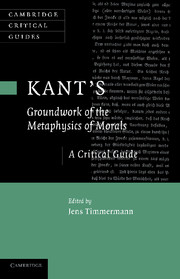Book contents
- Frontmatter
- Contents
- List of contributors
- List of translations and abbreviations
- Introduction
- 1 Ethics and anthropology in the development of Kant's moral philosophy
- 2 Happiness in the Groundwork
- 3 Acting from duty: inclination, reason and moral worth
- 4 Making the law visible: the role of examples in Kant's ethics
- 5 The moral law as causal law
- 6 Dignity and the formula of humanity
- 7 Kant's kingdom of ends: metaphysical, not political
- 8 Kant against the ‘spurious principles of morality’
- 9 Autonomy and impartiality: Groundwork III
- 10 Problems with freedom: Kant's argument in Groundwork III and its subsequent emendations
- 11 Freedom and reason in Groundwork III
- Bibliography
- Index
3 - Acting from duty: inclination, reason and moral worth
Published online by Cambridge University Press: 04 August 2010
- Frontmatter
- Contents
- List of contributors
- List of translations and abbreviations
- Introduction
- 1 Ethics and anthropology in the development of Kant's moral philosophy
- 2 Happiness in the Groundwork
- 3 Acting from duty: inclination, reason and moral worth
- 4 Making the law visible: the role of examples in Kant's ethics
- 5 The moral law as causal law
- 6 Dignity and the formula of humanity
- 7 Kant's kingdom of ends: metaphysical, not political
- 8 Kant against the ‘spurious principles of morality’
- 9 Autonomy and impartiality: Groundwork III
- 10 Problems with freedom: Kant's argument in Groundwork III and its subsequent emendations
- 11 Freedom and reason in Groundwork III
- Bibliography
- Index
Summary
MOTIVATIONAL RIGORISM AND KANT'S SEARCH FOR THE MORAL LAW
Section I of Kant's Groundwork of the Metaphysics of Morals is meant to lead us from our everyday conception of morality to the supreme principle of all moral action, officially christened the ‘categorical imperative’ some twenty Academy pages further into the treatise. It is quite striking that in this first section Kant dispenses with the notorious technical language that pervades not just other parts of the Groundwork but also most of the remaining philosophical writings of the critical period. The mere fact that Groundwork I is comparatively accessible does not, of course, make it straightforward or uncontroversial. Kant's readers are faced with, amongst other things, four unconvincing paragraphs on the natural purpose of practical reason (G IV 394–6), a crucial change of topic from good volition to acting from duty (G IV 397), an unstated ‘first proposition’ about moral value that has baffled generations of interpreters (presumably G IV 397–9), and a contentious shift from an allegedly unproblematic principle of practical universalizability to a substantive moral command (G IV 402).
Moreover, the first section features the most famous examples of what critics have dubbed Kant's ‘motivational rigorism’: the thesis that actions are morally good only on condition that they are motivated by a sense of duty, rather than inclination. The first case – the example of the ‘shopkeeper’ (G IV 397) – concerns a higher-order inclination that leads to action in conformity with duty.
Keywords
- Type
- Chapter
- Information
- Kant's 'Groundwork of the Metaphysics of Morals'A Critical Guide, pp. 45 - 62Publisher: Cambridge University PressPrint publication year: 2009
- 32
- Cited by

